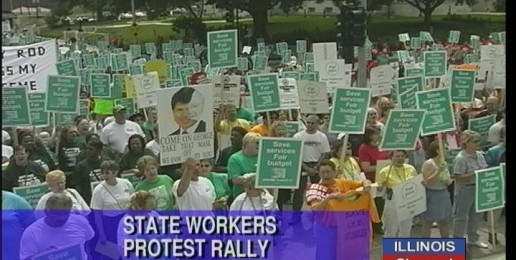
In the early twentieth century, unions were responsible for creating safe and healthy work environments. Unions helped protect people who worked in the private sector, including those who toiled in mines; worked for America’s burgeoning railroad system; and were employed in numerous other dangerous professions. The improvements in working conditions helped fuel the engine of what was to become the greatest nation on Earth.
As the son of a firefighter who was very involved with the Chicago Firefighters Union (Local 2), and as a former Teamster myself (Locals 743 and 744), I have more than my fair share of experience and understanding of both the good and bad aspects of unions.
Today, however, many union leaders push a political agenda that actually works against the best interests of the public they seek to serve. Indeed, the exorbitant pensions of public employees demanded by union bosses have contributed to the creation of the financial crisis now facing the state and nation.
In the private sector, companies and corporations have left the U.S., in part, because unreasonable union demands have made it more profitable for those in the private sector to conduct their operations offshore, which enables them to remain competitive locally, nationally and internationally.
This is not an indictment of all Americans who are members of unions. In fact, many individuals have little or no choice concerning whether or not to be a union member.
Recent stories involving local unions demonstrate how unions are actually working against the best interests of Illinois citizens, families and taxpayers in general.
Wal-Mart
Recently, the Chicago City Council approved the construction of two Wal-Mart stores. The addition of these two stores will bring the total number of this highly successful discount chain — which will be operating within Chicago’s city limits — to three. For years, the fiercest opposition to “big box” stores like Wal-Mart being built in the City came from local unions that opposed them primarily because Wal-Mart workers are non-union members. Union leaders and liberal, pro-union public officials do not like Wal-Mart because they claim that Wal-Mart employees are underpaid and do not receive benefits and other perks that come with union membership. But union leaders’ opposition to these stores came at a high price to the communities they would serve.
Many community leaders in Chicago welcomed Wal-Mart with open arms for a number of reasons. The largest corporation in America would bring hundreds of jobs to areas in the city which have perpetually high unemployment and have been especially hard hit by the current recession. Also, the location of the two planned Wal-Marts would serve regions that are referred to as “Food Deserts.” Often such areas are not served by any of the union-affiliated food chains. Additionally, many Chicagoans who live in poor neighborhoods do not own a vehicle and so cannot travel outside their community. This situation forces families to either shop at small, high-priced “convenience” stores in their neighborhoods — which do not meet their needs — or requires these families to travel considerable distances to reach union food chains, whose prices are much higher than Wal-Mart. Because Wal-Mart is a non-union corporation, they are able to keep their prices low and pass the savings along to their customers.
Also, many Wal-Marts include banking institutions and provide other financial services. Finally, Wal-Mart customers can purchase various products, besides groceries, including apparel and home improvement products, among other consumer services that cannot be found in some inner city neighborhoods.
In this case, it is clear that big labor’s reckless opposition to good paying non-union jobs, which delayed the arrival of low cost food and resources to low income communities in Chicago, were decidedly anti-family.
Road Construction
On July 2nd, the Laborers’ District Council of Chicago and Vicinity voted to walk off roadway construction projects in the Chicagoland area. The union representing construction workers in Chicagoland proper is the International Union of Operating Engineers, Local 150. However, the strike will affect workers on road construction, bridge repair, and sewer and water improvement projects in ten Chicago area counties.
In Chicago, construction crews walked away from repairs being done on the Eisenhower Expressway, one of the busiest highways in the entire nation. The Illinois Department of Transportation (IDOT) had to secure the sites to avoid headaches for the Fourth of July holiday and the return to normal traffic flow that would occur on Tuesday, July 6th when many motorists resumed regular use of the Eisenhower and other roadways currently under construction.
In the past, the American people have been willing to chip in and do their part when the nation has faced a crisis. Yet in a time when real unemployment numbers are hovering closer to 17 percent across the nation, apparently union bosses with the Laborers’ District Council of Chicago and Vicinity and specifically, the International Union of Operating Engineers feel it’s a good time to flex their muscles while many Americans struggle simply to put food on their tables. The strike was called because of language in the current contract proposal that would increase workers’ health care costs by 10 to 12 percent. *
These union workers are earning $45 to $50 an hour. This group includes the flaggers who hold signs warning motorists to slow down or stop. There would be thousands of Chicagoans who would be happy to earn a third of the wages these union leaders have negotiated for their members. Once again, unions demonstrate an unwillingness to do their part to serve the greater good, instead leaving Illinois taxpayers to foot the entire burden for costs related to America’s crumbling infrastructure.
This is another example of how big labor’s reckless pursuit of unrealistic, unsustainable wages and benefits are decidedly anti-family and come at the expense and inconvenience families and taxpayers.
* According to a recent Rasmussen Poll, 60 percent of Americans favor repealing the Health Care Reform bill that’s now law. Weren’t the unions in favor of it because it was supposed to bring health care costs down and resolve all of our healthcare problems? Apparently the union leaders are as out of step with the average American as are our elected Congressmen in Washington, D.C.
Chicago Public Schools
The Chicago Public Schools System (CPS) must cut its budget. There is simply not enough money to support an already bloated system which most would agree has failed many children. But here’s the rub. You would think the planned lay-offs required to meet the budget shortfall would be implemented in such a way as to provide the best education possible for Chicago’s children. Most reasonable Chicago residents would agree the best teachers should be the last to be laid-off. Yet a merit system is not being implemented.
Many Chicagoans feel good teachers deserve a good salary. In fact, there are some who contend teachers in parochial schools, who earn far less than their public school counterparts, do a much better job in terms of providing a quality education for their students. But the system of public education — which is dominated by and at the whim of powerful teachers unions — does not follow a path of common sense. Bloated salaries for union management should be cut and bad teachers, no matter how long they’ve been teaching, should be the first of the 2,700 teachers be laid off. Yet the unions continue to protect the jobs of these individuals who have failed our children in the third largest school system in America.
The CTUs refusal to lay off bad teachers directly and negatively affects thousands of Chicago students. Once again, we have another example of how big labor refuses to act in the best interests of taxpayers who expect their resources to be used effectively and efficiently.






















